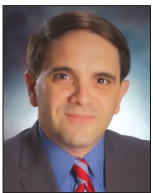Finding greatness through opportunity
Dear Forum News Readers: The following is an excerpt from my new book, “Bright Spots, Big Country – What Makes America Great,” just released on July 4 and is available wherever books are sold. Hope you all had a great fourth of July.
It was Saturday night, Aug. 14, 1943, when the Allies shelled my father’s village, along the southern coast in Italy. From their ships in the Mediterranean Sea, the naval bombardment from the Allies was brutal – over 1,000 shells were fired in less than 20 minutes.
And it was all gone. My father’s home, carved into the mountainside, collapsed. All of their belongings reduced to nothingness. The shrapnel had left little unscathed, as my father, his parents and his siblings faced the dire task of finding food, shelter and clothing – and escaping German forces. As they made their journey into the hillside that night, with everything they owned packed on a mule drawn wagon, it was peasant farmers along the way who offered them shelter, food to eat, and a place to dry their clothes when they were soaked to the skin, and the opportunity to begin a new life.
After the Allies defeated the Germans, the fighting stopped in Italy. It would be months before electricity was restored, or government services of water or sanitation returned. There would be food rations to sustain them, in the meantime. My father’s family would then begin the seemingly unbearable task of rebuilding their home and finding a way to support themselves, with my father’s two sisters (8 years old and 2 years old), in tow. Eventually, they rebuilt their war-torn home, and my father and grandfather established a modest living painting and building.
More than 20 years would pass before my father would make another journey into the “hillside,” but this time with everything he owned packed in a small, borrowed suitcase. That was the day he landed in New Orleans, La. It was Aug. 23, 1964, and he was only supposed to visit for three weeks. But it was by chance that he was here at all.
As he went to Baton Rouge High School to learn English, my father didn’t know of John Winthrop, one of the first leaders of the colonies in 1630, who wrote about how America could serve as an example for the world.
As he mailed reel-to-reel audiotapes back to his mother and father describing how he was doing
in America (because calling overseas was just too expensive), he had no
idea of the political philosophy of limited government or the importance
of the 10th Amendment.
As
he painted houses during the day, while going to school at night, he
didn’t know of Alexis de Tocqueville of France. He hadn’t studied
Benjamin Franklin's writings, or knew of the Gettysburg Address, nor had
he read the Declaration of Independence.
And yet he knew their principles, somehow, like the back of his hand.
He
understood Thomas Jefferson’s adage, “I like the dreams of the future
better than the history of the past.” He knew firsthand that “energy and
persistence conquer all things,” just as Benjamin Franklin had written
almost 200 years before. He had not studied much American history, but
he understood that “perseverance and spirit have done wonders in all
ages,” just as George Washington had written in 1775.
He
had not read the writings of John Adams, but he knew that “to be good
and to do good is all we have to do.” He may have only faintly known of
Abraham Lincoln, but he clearly understood that “things may come to
those who wait, but only the things left by those who hustle.”
All
along, though, he worked hard to make the most of this opportunity in
freedom he had been given. He soon got a job as an estimator for a
construction company. Later, he started his own. Just 10 short years
later, my parents bought their first house. It wasn’t a large one, but
it was cared for, and made better because he and my Mom lived there.
Together, we made it a home.
And
if you are reading this, more than likely you want to make this home –
our American home – better because you lived here, too.
And
you can. You see, in much of the world, if your father is a bricklayer,
you become a bricklayer. If your mother is a schoolteacher, you become a
schoolteacher. Success stories of people in America who have risen up
from nothing are so common that they are unremarkable, in many ways, but
don’t get mentioned nearly enough.
This
is because the American Dream is not as much about material and
monetary wealth, as it is the opportunity in which every person can
attain their fullest potential, regardless of their circumstances of
birth or position. Americans are not great because they were born in
America. That’s geography.
The greatness of America is that it allows each of us to see the greatness in ourselves.
If
my father had focused more on what he didn’t know, or didn’t have, or
how unlikely success would be when he first came to this country, my
writing to you today would likely have never occurred.
Instead, he focused on what was working for him, and how to simply do more of it.
This is how America became great, one generation at a time – and it’s our turn now, to build on what works.
With this book in your hand, you’re about to find out that we can, once again.
Louis
R. Avallone is a Shreveport businessman and attorney. He is also a
former aide to U.S. Representative Jim McCrery and editor of The Caddo
Republican. His columns have appeared regularly in The Forum since 2007.
Follow him on Facebook, on Twitter @louisravallone or by e-mail at [email protected].